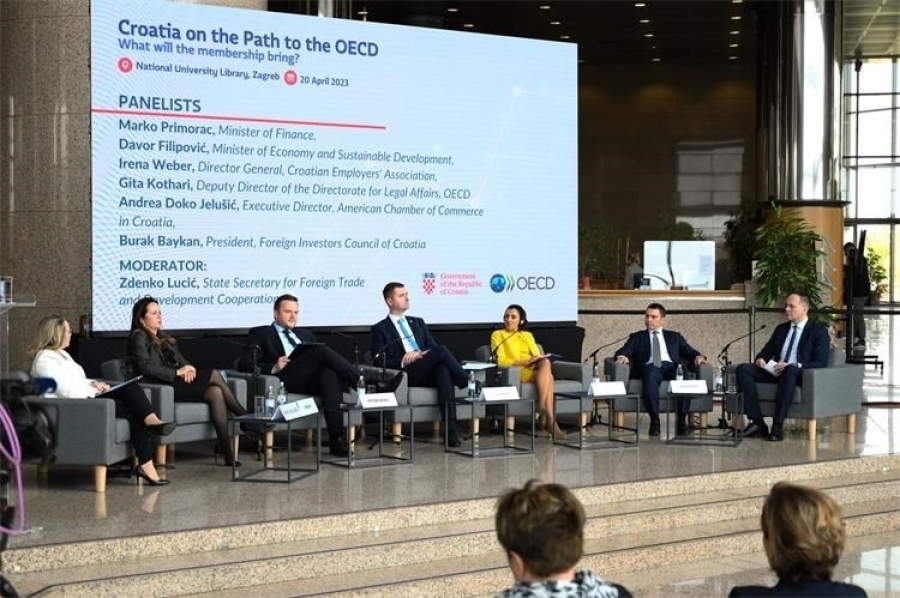Croatian enterprises will be relieved by €132 million this year through cuts in parafiscal levies, Economy Minister Davor Filipović said on Thursday, adding that this is one of the issues on which Croatia is cooperating with the Organisation for Economic Co-operation and Development.
He was speaking at a panel held as part of a conference on Croatia’s path to OECD membership, which was organised by the government and the Foreign Ministry.
Croatia began official negotiations to join the OECD last July. The OECD has 38 member states, including 22 EU member states, and 257 legal instruments which Croatia has to comply with in order to join.
Filipović said joining the OECD was the last foreign policy goal Croatia still had to achieve.
Croatia’s accession to the Schengen and euro areas brought immediate positive effects for its economy, he said, mentioning US company Jabil’s investment in Osijek, which will create more than 1,500 jobs, and Knauf’s €120 million investment in production expansion in Novi Marof.
The OECD will give Croatia additional strength to be even stronger on the global investment map, Filipović said.
“We will do our best to apply the best practices recommended by the OECD, working together to create a new strategic framework for stimulating foreign investment,” he added.
Finance Minister Marko Primorac said that joining the Schengen and euro areas had required meeting a score of requirements and reforms. Membership makes the Croatian economy stronger and more resilient to crises as well as creating the prerequisites for a healthier and more stable economic growth, he added.
Membership, however, is not the only and biggest benefit, the path is, and the same applies to the path to join the OECD, Primorac said.
A score of criteria has to be met, Croatian legislation and our economic processes need to be aligned with the OECD’s legal instruments, he added.
Joining the OECD can be used to fine-tune the system, to deal with any shortcomings, and to improve the economic policy where there is room for progress, Primorac said.
He recalled that Croatia’s GDP grew 6.3% last year and announced that at its next session, the government will revise upwards its growth estimate for this year, from 0.7% to about 2%.
OECD Deputy Director for Legal Affairs Gita Kothari, speaking of membership benefits, underlined the OECD’s strong support for reforms and policy making by giving recommendations.
Membership also provides a platform for debate on how to deal with challenges and for sharing the best practices, she said.
Membership will also give Croatia a voice in the global debate on current issues such as artificial intelligence, she said, adding that another benefit for the economy is reputation and investment confidence.
Membership is recognition that a country applies the OECD’s high standards and best practices, and it also impacts the credit rating, Kothari said.
The process of joining the OECD facilitates the necessary reforms, which will result in a better business environment and higher productivity and competitiveness for the economy, Croatian Employers Association director-general Irena Weber said.
She underlined the judicial, tax and labour law reforms. Due to the labour shortage, the law should be more modern and more flexible, she said.
The announcement of Croatia’s OECD accession was welcomed very positively among the 310 members of the American Chamber of Commerce in Croatia, mainly foreign firms which employ almost 100,000 people, said Andrea Doko Jelušić, the Chamber executive director.
AmCham often cited OECD principles in the reforms it proposed to Croatian ministries, she said, adding that the focus should be on the business climate, competitiveness, economic growth, stronger institutions, and higher standards.
Although administration remains a reform challenge, it has supported most of the projects and initiatives of the Foreign Investors Council in Croatia, said its president, Burak Baykan.
The last decade represents a historic period for Croatia, given the accession to the EU, Schengen, and euro area, he said, adding that it is not easy for the private and public sectors to adopt all those changes.
But we see significant effort and progress when it comes to administration, Baykan said, underlining digitalisation and dealing with the labour shortage.
Text: HIna/MVEP












